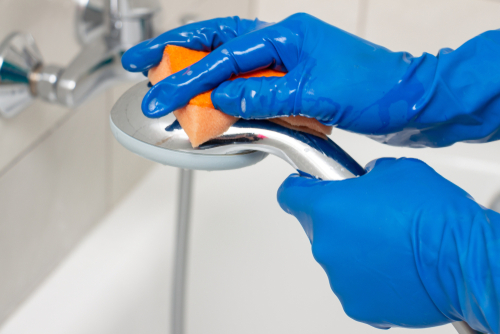Due to increasing environmental awareness combined with the increased popularity of cleaning hack videos, (#CleanTok) which boasts 26.9 billion views on TikTok, Two-fifths (41%) of Brits have switched from store bought cleaning products to homemade versions made with household ingredients such as lemon juice, white vinegar and bicarbonate of soda.
Whilst these ingredients have long been associated with being alternative cleaning products, what is lesser known is the damage they can do in the home if not used correctly, as 14% of Brits claim to have damaged their kitchen surfaces when cleaning with these ingredients.
The home improvement retailer Wickes has enlisted experts to shed light on how these alternative cleaning products should be used, and how to avoid causing irreversible stains to work surfaces and hobs in kitchens up and down the country.

Home services business Fantastic Services and cleaning expert Nicola Rodriguez from the home improvement business Essex House Dolly share their experience and wisdom on the topic, advising on what Brits need to know before following cleaning advice on TikTok.
Cleaning expert Nicola reveals the damage white vinegar can have on these common household surfaces and equipment. She says:
1. Knives – “Vinegar can damage the finish on knives and leave the edge pitted. Other common metals in the kitchen that you should keep away from vinegar include aluminium and copper. The best cleaning option is dishwashing liquid and warm water.”
2. Marble – “The vinegar dulls the stone but also causes spills to penetrate the stone’s surface, leaving permanent stains and etching. Vinegar easily damages any sealers applied to a stone surface.”
3. Granite – “It leaves acids on worktops causing it to etch.”
4. Eggy spills – “The acidity of the vinegar causes the egg to coagulate which then makes it harder to remove.”
5. Wood furniture – “Only use if diluted as the mild acidity again can damage the wood.”
6. Dishwasher – “Never put in the dispenser drawer as the acid is strong enough to melt the rubber gaskets. Instead, I’d recommend putting a cup of vinegar on the bottom of your rack and then start your cycle.”
7. Stainless Steel – “Never use it on this surface as it will cause corrosion.”
8. Cast Iron – “It will cause pitting and rusting by removing the seasoning oils that protect the iron.”
9. Electronics – “Vinegar damages the anti-glare coating on screens such as TVs, mobiles and computer screens.”
10. Rubber Gaskets & Hoses – “Vinegar will cause the rubber to disintegrate.”
Cleaning specialist Heligert Gojda adds:
“The damage caused by using improper cleaning products on surfaces like natural stone or ceramic hobs can be irreversible. Acidic substances can etch the stone’s surface, leaving marks that can’t be polished away.
“Additionally, scratches on glass or ceramic hobs might also be permanent. Therefore, it is clear why proper cleaning care and maintenance are essential.
“Warm soapy water and a soft cloth or sponge are effective and safe for kitchen worktops, hobs, and most general kitchen surfaces. However, specific cleaning products designed for the surface material are often the best choice, e.g., granite cleaner for granite countertops or a glass ceramic cleaner for ceramic hobs.”
When it comes to some of the most common cleaning mistakes, Heligert shared:
“One common mistake is using abrasive materials or cleaners that are too harsh for the surface and neglecting to clean up spills promptly, allowing them to set in.
“In addition to these, using excessive force when scrubbing is another. This can lead to scratches on surfaces like the ceramic hobs in your kitchen. It’s crucial to follow the manufacturer’s recommendations and use suitable cleaning products and tools so you do not have to deal with bigger issues.”